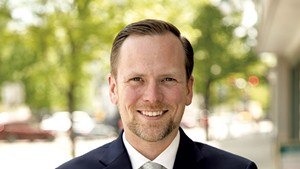
- Ben Deflorio
- John Helfant (right) at a school board meeting at Randolph Union High School
John Helfant is one of the most vocal parents in the Orange Southwest School District. At a school board meeting last year, the father of three accused the school district of promoting "leftism" and "subtle critical race theory" for canceling a Chick-fil-A fundraiser because of the company's support of anti-LGBTQ groups. He criticized Randolph Union High School for reprimanding students who chanted the anti-Biden slogan "Let's Go, Brandon" at a basketball game. And he called for taking down the Black Lives Matter flag flying outside the high school.
In October, Helfant waded into the public controversy involving a 14-year-old transgender girl who used a female locker room at Randolph Union. In a letter to the school district published on the conservative website Vermont Daily Chronicle, he argued that the teen was guilty of "voyeurism" — and school district officials were "accessories" to a crime.
Helfant lives in East Roxbury and his kids attend the Orange Southwest school district, but his opinions have stirred controversy in Northfield, the Washington County town where he has served as police chief for the past four years.
Helfant argues that he should be free to speak his mind, just like anybody else. Critics contend he's demonstrated intolerance of transgender people and that his comments have fostered mistrust of law enforcement. Some have called for him to be fired from his $86,000-a-year job.
Orange Southwest school officials have lodged their own complaint about Helfant, according to public records obtained by Seven Days. They wrote that Helfant's conduct — in particular, the piece he published on Vermont Daily Chronicle — was "unbecoming of a Vermont law enforcement official" and asked Northfield to investigate and "take appropriate action."
Town manager Jeff Schulz said Northfield has looked into complaints about its police chief and will continue to do so. Schulz declined to say whether the town would take any action, calling the situation a personnel issue.
Helfant, meanwhile, said his personal views as a parent have no bearing on his ability to carry out his duties in a professional, unbiased manner. He said he plans to stay in his job until at least May, when he'll become eligible to collect retirement benefits.
"People speak out all the time: Plumbers, doctors, lawyers even, advocate for their kids at school board meetings," Helfant said in a phone interview last week. "So why don't I get to?"
Some argue that Helfant's pattern of behavior goes beyond simply advocating for his own children.
A coalition that includes Northfield Middle & High School's Gender & Sexuality Alliance, United Church of Northfield, statewide advocacy groups including Outright Vermont and Rights & Democracy Vermont, and a group of "concerned parents, educators, and students of Northfield" filed a formal complaint to the town in January. The authors cited Helfant's comments and called for the town to "turn over the office of police chief to someone capable of interpreting the laws faithfully."
Peter Evans, moderator of the United Church of Northfield's governing body, voted with fellow church leaders to sign the complaint. He served as principal of Montpelier High School from 2002 to 2012 and said he's become increasingly troubled by Helfant's public comments.
"How could he both exercise his freedom of speech in a neighboring community against a protected class of people and then come here and swear that he will do whatever he has to to protect those same people?" Evans said. "There's something really twisted about that logic."
A mother of a transgender Northfield Elementary School student who asked to remain anonymous to protect the identity of her child signed the letter. Because Helfant believes that a transgender student using a locker room that aligns with their gender identity is committing a crime, she said she's worried about how he would treat her child in a similar situation.
(Vermont Agency of Education guidance states that transgender students should not be required to use a locker room or restroom that conflicts with the student's gender identity. The state's Public Accommodations Act prohibits schools from withholding accommodations based on a person's gender identity.)
"My fear is that it's only going to take one parent to cause a real problem for my child," the mother said, "and now I am fully aware the local law enforcement is not going to back me, is not going to back my child, and doesn't even believe in the actual statutes and laws which are put out there, which is his job."
Merry Kay Shernock, a grandparent of Northfield students, went a step further.
"These kind of remarks have a chilling effect on all children — not just LGBTQ, not just the kids who don't subscribe to the gender binary ... any kid who feels like he or she or they might be different from the rest," Shernock said.
Helfant — who specified in a phone interview that he was speaking as a parent, not as a police officer — said he firmly believes that transgender students should not use a bathroom or locker room with people who have different genitalia.
"We, as a society, have given consent to use those facilities in front of people with the same genitalia. We don't, as a society, give approval of people with the opposite genitalia to be standing in there next to us showering; otherwise they would say it's a unisex shower," he said. "And that's just the norms of society ... So, for people to say it's just normal, it's not."
Helfant said he understands that the Public Accommodations Act doesn't allow for discrimination based on gender identity. But he believes that having single-occupancy changing rooms for everyone, or specific times during which a transgender student could use the changing room apart from others, would enable schools to comply with the statute while maintaining what he calls "women's privacy rights."
Vermont's top law enforcement official, Attorney General Charity Clark, took issue with Helfant's interpretation of the voyeurism statute.
"A student used a locker room for its intended purpose and chose the locker room with the sign on the door that aligned with their gender identity," Clark wrote in a statement. "I find a suggestion that the State should somehow criminalize and punish that student — and the school as an accessory — deeply offensive and harmful. All children, including transgender youth, deserve to live in a state that promotes acceptance, not hate and bullying."
But Helfant said he never called for the transgender student to be arrested; he simply told school district officials "they needed to change what they were doing in the school because this statute exists ... As a parent, I was just making them aware that they had this conundrum."
Helfant said his record of 30-plus years in law enforcement — 28 as a Vermont state trooper — speaks for itself.
"Find a time when I was in uniform, as a chief or a trooper ... where there's a single complaint that I was biased against somebody because of their gender identity or their sexual orientation," Helfant said. "Quite honestly, we don't care about that. We're literally just looking at the law."
Helfant noted that his arrest records, when broken down by racial demographics, show no discrimination — including toward people of color.
But the way he handled two traffic stops — one involving a Hispanic man; the other, an African American — led then-Washington County state's attorney Rory Thibault to issue a so-called Brady-Giglio letter about Helfant in 2020.
Such letters put a police officer and the officer's employer — and defense attorneys — on notice that the officer's credibility has been called into question. In both cases, white women were driving the vehicles Helfant stopped. Thibault cited his "disparate treatment" of the two male passengers compared with his treatment of the women.
In one instance, Helfant did not mention in his affidavit that the suspect revoked consent for a body search, though it was recorded by another officer's bodycam. In the other case, Thibault concluded that Helfant exceeded the scope of a consent-to-search by examining the man's cellphone.
Thibault's letter said he would presumptively decline to prosecute Helfant's cases that involved nonviolent offenses. Helfant maintains that there are several untrue assertions in Thibault's letter; Thibault stands by it.
"There's never been any sort of introspection of Maybe I should have done better or In the future, I would like to do this," Thibault said of Helfant's response to the letter. "It's just defiance."
The new Washington County state's attorney, Michelle Donnelly, said prosecutors in her office will continue to consider the letter when determining whether to go to trial with cases from the Northfield Police Department. She said she's aware of concerns about Helfant but hasn't yet formed a working relationship with him.
Colchester Police Chief Douglas Allen, president of the Vermont Association of Chiefs of Police, declined to comment on Helfant's conduct, calling it "an issue between the chief and his community."
"However, I wish to make clear that statements that harm, or isolate portions of the public that we serve and protect are not representative of our Association," Allen wrote in an email. "Our association believes strongly in professional regulation and public accountability."
Vermont Law School assistant professor Jared Carter, who specializes in First Amendment law, said the U.S. Supreme Court's decision in Garcetti v. Ceballos laid out three criteria for determining whether a government employee has crossed the line by speaking out: Is the employee speaking on a matter of public concern? And is the person speaking as a private citizen? If the answers to those first two questions are yes, as appears to be the case for Helfant, the final question is whether the employee's interest in speaking out outweighs their employer's need to accomplish its mission. Applied to Helfant, the question could be whether the police chief's public speech hinders the ability of the Northfield Police Department to carry out its mission.
If the town fired Helfant and its lawyers weren't able to prove that his off-duty conduct hampered the department, that could be problematic, Carter said. He sees parallels to a recent case in Windsor, in which school principal Tiffany Riley was fired after posting comments about the Black Lives Matter movement on Facebook. Riley later sued the Windsor Southeast Supervisory Union for wrongful termination and agreed to a $650,000 settlement.
Falko Schilling, advocacy director for the American Civil Liberties Union of Vermont, said Helfant has the right to voice his personal opinions when he's not on duty. However, he characterized Helfant's views as "both wrong as a matter of law and deeply offensive to Vermonters who care about the rights and dignity of trans students."
"Community members concerned by Helfant's damaging and irresponsible rhetoric can and should speak out and advocate for change in Northfield and beyond," Schilling said.
That's what town residents such as Shernock intend to do.
Shernock, who is running for the Northfield Selectboard, said she believes that the town's young people are paying attention to Helfant's behavior and people's reaction to it.
No doubt they'll notice, Shernock said: "Does anyone stand up to this guy?"
Correction, February 17, 2023: A previous version of this story incorrectly identified a town as part of the Orange Southwest School District.













Comments
Comments are closed.
From 2014-2020, Seven Days allowed readers to comment on all stories posted on our website. While we've appreciated the suggestions and insights, right now Seven Days is prioritizing our core mission — producing high-quality, responsible local journalism — over moderating online debates between readers.
To criticize, correct or praise our reporting, please send us a letter to the editor or send us a tip. We’ll check it out and report the results.
Online comments may return when we have better tech tools for managing them. Thanks for reading.